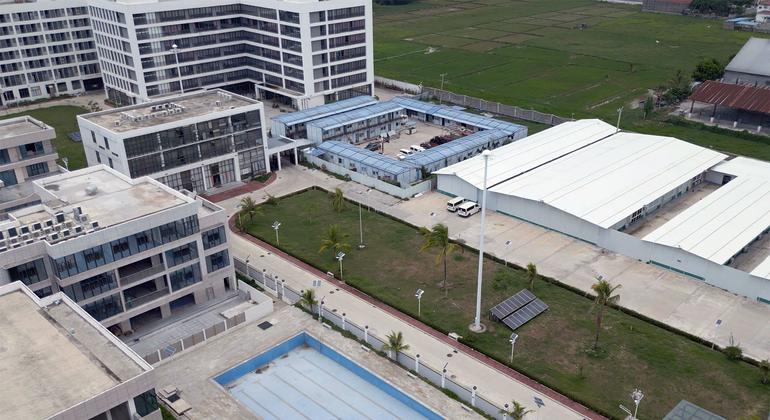In recent years, there has been a troubling increase in illicit operations known as scam farms across Southeast Asia, particularly in the Philippines. These scam farms have thrived alongside legal gambling businesses, posing a significant challenge to law enforcement and regulatory authorities. The rise of these criminal enterprises has been exacerbated by the COVID-19 pandemic, which has created economic hardships and vulnerabilities that are exploited by criminal networks.
The United Nations Office on Drugs and Crime (UNODC) has been actively involved in supporting countries in the region to combat the influence of these criminal networks. Benedikt Hofmann, the UNODC Deputy Regional Representative for Southeast Asia and the Pacific, recently visited a scam farm in the Philippines that was raided earlier this year. In an exclusive tour with UN News, Hofmann shed light on the inner workings of these scam farms and the challenges faced in dismantling them.
Located just a few hours north of Manila, the scam farm in northern Philippines is a stark example of the operations that are prevalent in the region. Hofmann described the compound as housing various buildings where people work, eat, and sleep. The facilities included cafeterias, dormitories, and offices where the illicit activities took place. Despite the presence of legal gambling operations that were registered and regulated by the government, the scam farms operated clandestinely, hidden from regulatory oversight.
During the tour, Hofmann revealed the different buildings within the compound dedicated to specific scam operations targeting different markets. He described how Vietnamese workers ran scams targeting the Vietnamese market from one building, while Chinese-speaking workers conducted scams targeting the Chinese market from another. The contrast between the lives of the workers, who were often coerced into working at the scam farm, and the wealthy bosses who controlled the compound was striking.
The scale and sophistication of the scam farm surprised Hofmann, likening it to a well-established tech company. The compound housed around 700 people at the time of the raid, though other scam farms in the region were known to have even larger populations. The disparity between the living conditions of the workers and the wealth of the bosses highlighted the exploitation and inequality prevalent within these criminal enterprises.
One of the most concerning aspects of the scam farms was the lack of freedom experienced by the workers. They were essentially fenced off from the outside world, with all their daily needs provided for within the compound. Facilities such as restaurants, dormitories, barbershops, and even a karaoke bar were available for the workers, who could stay for months without needing to leave. However, the workers were effectively trapped within the compound, unable to escape due to coercion and threats of violence.
Reports of torture and violence against workers who attempted to leave the scam farms were particularly distressing. Victims recounted harrowing experiences of abuse and brutality at the hands of their captors, highlighting the grave human rights abuses that occurred within these criminal enterprises. The stories of those who were rescued from the scam farms shed light on the dark underbelly of these operations and the urgent need for concerted action to dismantle them.
UNODC’s efforts to support countries in combating the influence of criminal networks in Southeast Asia are crucial in addressing the proliferation of scam farms and other illicit activities. By promoting cooperation and collaboration among regional stakeholders, UNODC aims to disrupt and dismantle these criminal enterprises, safeguarding vulnerable populations from exploitation and abuse.
In conclusion, the rise of scam farms in Southeast Asia, particularly in the Philippines, poses a significant challenge to law enforcement and regulatory authorities. The exploitation and abuse of vulnerable populations within these criminal enterprises underscore the urgent need for concerted action to combat the influence of criminal networks in the region. UNODC’s support and assistance are instrumental in addressing these challenges and dismantling the operations of scam farms, ultimately ensuring the protection and safety of those affected by these illicit activities.









